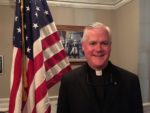The Donkey’s Vital Work, and Ours
“Jesus . . . sent two of his disciples and said to them: ‘Go into the village opposite you, and immediately upon entering it, you will find a colt tethered on which no one has ever sat. Untie it and bring it here. If anyone should say to you, ‘Why are you doing this?’ reply, ‘The Master has need of it and will send it back here at once.’” (Mk 11:1-3)
The triumphal entry of Jesus Christ into Jerusalem on the back of a donkey is celebrated each year on Palm Sunday, when the faithful hold palm branches and sing “Hosanna to the Son of David,” praising the King who comes in the name of the Lord. Jesus is a humble king, riding on a humble animal. The One who in the beginning made all things arrives in the City of David where by his crucifixion, death, and Resurrection, he will now remake all things. The apparent victory of evil over good, on what the faithful gratefully call Good Friday, is just that, an apparent victory. God has triumphed, and he will reveal on the blessed Easter morn that new life in Christ is stronger than death.
But all that will come only after Jesus rides on the donkey into the royal city; the true king traveling in a very un-kinglike manner, yet acclaimed as king by expectant Jewish Passover pilgrims in Jerusalem who heard that he was approaching. We might say that Jesus was, in a way, hiding his kingship in plain sight, or at least from his apostles, who, John tells us, “did not understand this at first, but when Jesus had been glorified they remembered that these things were written about him and that they had done this for him.” (Jn 12:16) The apostles provide a consoling reminder to sometimes unsteady and distracted believers like us that even those close to Jesus do not always see the big picture or understand its true meaning. Palm Sunday is a good moment to stop and regain our faith bearings.
God’s big picture is what came into view that first Holy Week. Faith in Christ risen from the dead permits us to appreciate the divine paradox of all our Lord went through during his passion and death. He paid the price for our sins and revealed that the fitting way to honor true kingship consists not in external glories and popular acclaim, but rather in confidently and humbly traveling with Christ along the path of God’s providential designs, wherever they may take us—even to Calvary. Yet we know that Calvary is never the end of the story.
People who pray and work for an end to legalized abortion and euthanasia—and other associated horrors visited upon our society by profoundly misguided people—are in many ways like the donkey that carried Christ into Jerusalem. Chosen by Christ, guided by the apostles, they bring the Word of new life into the byways of our cities and towns. Humble servants of the greatest good, we prolifers need to remind ourselves that our job is a vital one, which we fulfill by bringing Christ and his truth into places where death and lies always seem to have the upper hand, but where in fact God is not absent or inactive. Just as Jesus chose to depend on a beast of burden to go to the place where he would work his greatest miracle, so he has called us to do our humble part for the cause of truth and goodness in this world of sorrows and troubles. The Master indeed has need of us, as he needed that donkey, because this is how he has chosen to enter into the hearts and minds of people today, so as to free them from deadly errors that result in death and destruction. We are the bearers of life when we act like the donkey and go where God directs us.
A Blessed Holy Week to all!










